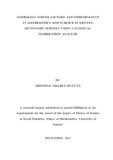| dc.description.abstract | The level of performance and participation in Science, Technology, Engineering and
Mathematics (STEM) career subjects remains low in Kenya despite STEM’s critical
role in economic development. Numerous factors contribute to students’ academic
achievement in STEM education. This study focusses on modelling school factors
that affect the performance in mathematics and science in Kenyan secondary schools
using Canonical Correlation Analysis (CCA). The objectives of the study include
determining: the magnitude of the relationship between school factors and performance
in STEM education, the most influential subject in describing the level of STEM
education, the most contributing school factor to STEM education and a model to
predict performance in STEM education given school factors. This research utilised
data from 9,834 candidates of year 2015 Kenya Certificate of Secondary Education
(KCSE) from 77 public secondary schools in Nairobi County. CCA is a multivariate
data analysis technique that seeks to establish whether two sets of variables, predictor
and criterion, are independent of each other. Given that the two sets of variables
are dependent, CCA is able to represent a relationship between the sets of variables
rather than individual variables. From the 2015 KCSE data, CCA revealed that school
factors significantly correlate with the level of performance in STEM education. Based
on standardised canonical coefficients and canonical loadings, the subjects that mainly
influence the level of performance in STEM education were found to be mathematics
and physics. Further assessment of the canonical cross loadings from the two variate
pairs revealed that the proportion of students with mean grades of C+ and above
and the proportions of students taking biology and physics were found to contribute
very highly to the level of performance in STEM education. The study recommends
increased staffing in physics due to the fact that physics is an optional subject yet it
has comparatively larger loadings than biology and chemistry which have higher levels
of participation. Also, the study recommends that further studies should be done to
establish the relationship between individual factors and participation and performance
in STEM career subjects. | en_US |



